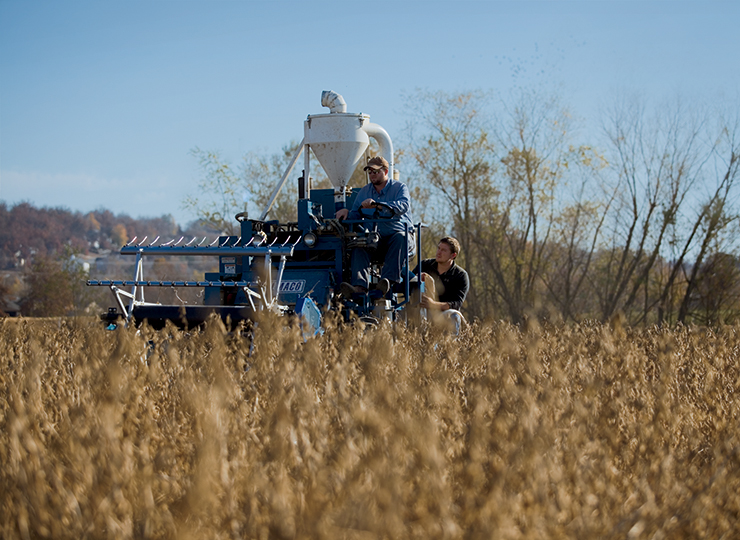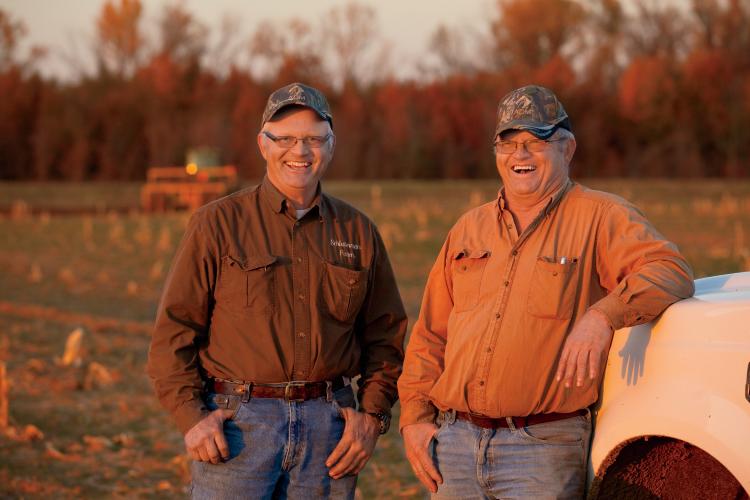Home > Arkansas > Arkansas Farm to Table > Snacking on Soy: Arkansas Grows Edamame Commercially
Snacking on Soy: Arkansas Grows Edamame Commercially

With the exception of just a few first-year growing pains, Arkansas farmer Mike Schluterman was pleased with his endeavor in edamame.
“I think it’s an opportunity for a lot of farmers to maybe go in and branch out a little bit,” says Schluterman, one of a dozen farmers in the state to grow the soybean-related product in 2012 through a partnership with the JYC International food company in Houston. “I made money with edamame (in 2012), and I plan to increase my acreage. There is going to be potential.”
Much of the potential has already been realized. Arkansas became the first state to grow edamame commercially, and a processing plant was opened in Mulberry to handle production and shipment of the crop. American Vegetable Soybean and Edamame, Inc. (AVS), a subsidiary of JYC International, directly works with 12 farms in Arkansas to grow 900 acres of edamame.
“It was a good year,” says Michael Chaney, field manager for AVS who served as liaison between JYC International and the edamame growers. “The farmers we worked with in the first year are wanting to increase acreage, and we’re also seeing some trends where some of their neighbors are becoming interested as well.”
Edamame, one of the fastest-growing specialty foods in the country, is a soybean that can be eaten as a snack, a vegetable dish or processed into sweets. Its nutritional benefits have been touted for years.
JYC International, founded in the mid-1990s, specializes in frozen food products such as edamame, spring rolls and other Asian appetizer products. The company had heretofore imported edamame from China.

But with research being done at the University of Arkansas on edamame – particularly work on new varieties conducted by Dr. Pengyin Chen, a soybean breeder from the university’s System Division of Agriculture – JYC looked to Arkansas as the state most suited for growing the crop.
Arkansas farmers planted a Chinese variety of edamame as well as one developed by Chen called “UA Kirksey,” named in honor of longtime soybean industry leader Joe Kirksey of Mulberry. Though edamame is a soybean, farmers found it took a little more maintenance to grow than its “cousin.” Research is being done to work out the growing kinks, particularly in weed control. Few herbicides have been approved for edamame, but a weed scientist from the university is optimistic for a solution in 2013
As growers were tending their crops, JYC International completed its 32,000-square-foot processing plant in Mulberry in summer 2012. It added around 40 employees to the area, a number expected to increase to around 60 in the next couple of years.
“We’ll now be able to have edamame here in the states,” Chaney says. “We’ll have a place where we’ll have employees in sorting, packaging and shipping edamame from Mulberry. It’s helping our economy, to have a place to have jobs and an opportunity to increase production and add even more jobs.”
Schluterman, who has a 3,000-acre farm on the Arkansas River in Paris, is one farmer who is sold on edamame. He grew about 40 acres of it in 2012 and plans to grow 10 times that amount in 2013.
“Everything worked out for us,” he says. “They (AVS) harvested the beans for us and handled the shipping. We got about a $1,000 an acre for it. We’re going to try to increase to about 400 acres next year.”



